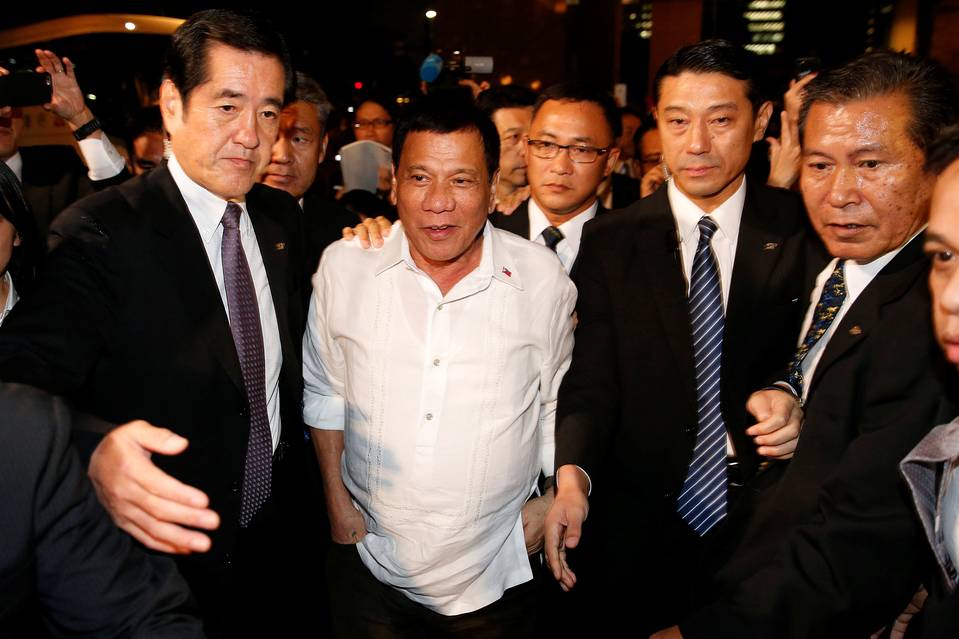
The Wall Street Journal reports: "Philippine President Rodrigo Duterte arrived in Japan on Tuesday amid rising concerns about what his recent rapprochement with China and deteriorating ties with the U.S. will mean for regional security. As one of the strongest U.S. allies in Asia—and the Philippines' biggest trading partner—Japan hopes to play a role in patching up relations between Manila and Washington....Mr. Duterte has been looking to build alliances with China, Japan and South Korea, believing the Philippines' future is tied to Asia and not the West, save maybe for Russia....In contrast to his animosity toward the U.S.—the former colonial power in the Philippines—Mr. Duterte is believed to view Japan positively."
The Washington Post comments: "Today, many of the world's leading democracies are afraid of China's economic power. So they make little or no effort to bilaterally press China on human rights issues. But the U.N. provides opportunities for them to come together to confront China on its human rights record collectively with a lawful international right and without being accused of unilaterally "interfering with another nation's internal affairs." Such an opportunity will come up on Oct. 28, when the U.N. General Assembly will vote to choose new members on its Human Rights Council....During its current three-year term as a member of the U.N. Human Rights Council, China has committed thousands of human rights violations....The upcoming vote will test any democratic country's commitment to human rights. I urge the United States to take the lead to form a collective action among all democracies purporting to strongly support universal principles of human rights. In sum, no reasonable person could possibly find any excuse to either overlook China's recent horrific human rights record or to trust one more time China's promises to be good in the future....Democracies around the world should openly cast a no vote on China."
Bloomberg Markets reports: "China's economic data has long drawn doubters. This year's remarkable run of three quarters all posting the same 6.7 percent year-on-year expansion is reviving the skeptics....Yet if the data is massaged -- and who outside of China's core economic policy makers can really say definitively whether it is or isn't -- there may be a silver lining...."If policy makers do insist on maintaining such high annual growth targets, it is arguably preferable in economic terms that they simply massage the GDP figures in order to meet them on paper rather than overstimulate the economy in an attempt to hit an unrealistically high target," says Julian Evans-Pritchard, an economist at Capital Economics in Singapore....Weighted by swelling debt, excess industrial capacity and the risk of a property bubble in major cities, they're having to walk a fine line to keep growth chugging along toward those goals without triggering a major financial crisis along the way."
- 2016-10-24 China’s Digital Soft Power Play
- 2016-10-23 China's Xi Jinping Seeks Safety in Numbers—Or Else
- 2016-10-21 China’s plan to organize its society relies on ‘big data’ to rate everyone
- 2016-10-20 Rodrigo Duterte and Xi Jinping Agree to Reopen South China Sea Talks
- 2016-10-19 As China’s Economy Slows, a Look at What Could Happen
- 2016-10-18 Kenya: China petitioned to stop building railway in park
- 2016-10-17 China courts Philippines leader Duterte amid signs of US rift
- 2016-10-16 Philippine Leader Rodrigo Duterte Rolls Dice With Embrace of China
- 2016-10-14 Study: China's 2-Child Policy Won't Lead to Population Boom
- 2016-10-13 US Reserves Right to Punish China Firms Working With NKorea
- The Wall Street Journal Duterte's Fling With China Could Prove Fleeting
- Bloomberg Markets China Data Doubters See a Silver Lining if GDP is Massaged
- TIME China's Latest Deadly Industrial Explosion Spotlights Dire Workplace Safety
- The New York Times Rodrigo Duterte Gets Closer to China, and the Neighbors Notice
- CNBC What's happening at the Communist Party of China's secret meeting this year?
- The New York Times Explosion Batters Neighborhood in China, Killing 14 and Wounding Nearly 150
- Reuters China's Xiongmai to recall up to 10,000 webcams after U.S. hack
- The New York Times Chinese Firm Says It Did All It Could Ahead of Cyberattack
- The Wall Street Journal China's Aggressive New Deal Makers: $199 Billion This Year and Counting
- Bloomberg As Yuan Sinks, Goldman Flags Scope for Gold Demand in China
- Reuters China says has political promise from West on graft fight
- Bloomberg Southeast Asia's Appetite for Steel Giving New Life to Chinese Mills
- The Wall Street Journal Duterte Looks to Reassure Skeptical Japan Over China Ties
- The Washington Post Say no to China's membership on the U.N. Human Rights Council
- The New York Times Sinosphere The 'Saddest' Polar Bear Lives in a Mall in China
- The New York Times Resettling China's 'Ecological Migrants'
- Bloomberg Gadfly China Oceanwide May Regret Genworth Lifeline
- The Washington Post The incredible rise of China and India, in two GIFs
- CBS News Robots are key in China's strategy to surpass rivals
- Quartz HIV is growing so fast among Chinese youth that a university is selling testing kits in vending machines